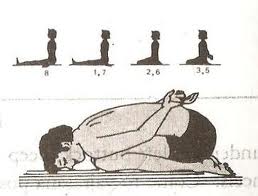Whenever you ask a patient about their stool habits, the most common answer is “AHH, it is so bad”. Constipation is a lot more than just a bowel movement. It is one of the most important topics of the hour. Lots of people suffer from constipation yet only a few dare to talk about it. Most of them are not even sure if they are suffering from constipation.
What is Constipation?
Constipation is a condition where it becomes difficult to pass stools. The only way to find out if you are suffering from constipation is by being aware of your daily purging pattern. The following are definite symptoms of constipation:
Unable to pass stools
Excessive straining during a bowel movement
Incomplete bowel movements
Stools that are dry, hard, and pellet-like
Children, elderly, pregnant women are the most common sufferers of constipation. Nevertheless most IT professionals, businessmen and others are also a victim of this. What could be the reason?
What causes Constipation?
- Diet: One of the most common causes of constipation is a diet low in fibre found in vegetables, fruits, and whole grains and high in fats found in cheese, eggs, and meats. People who eat ample of high-fibre foods are less likely to get affected from constipation.
- Insufficient liquids: Inadequate quantity of water or fruit juice may be one of the factors. Liquids like water and fresh fruit juice add fluid to the colon and bulk to stools, making bowel movements softer and easier to pass.
- Excessive consumption of tea/ coffee: Liquids, like coffee, tea and soft drinks that contain caffeine have a dehydrating effect on the colon. Thus reduction of this may help.
- Lack of Exercise: Lack of exercise can also lead to constipation. This can most commonly be observed in the elderly.
- Medications: Some of the medicines also cause constipation. Some of them are pain-killers, antacids, antispasmodics, antidepressants, iron supplements, diuretics, and anticonvulsants for epilepsy can slow down the passage of bowel movements.
- Irritable Bowel Syndrome (IBS): People suffering with IBS, also known as spastic colon, have spasms in the colon that affect bowel movements. Constipation and diarrhoea often alternate, and abdominal cramping, gassiness, and bloating are other common complaints.
- Pregnancy: Pregnancy brings about hormonal changes which can make a woman more susceptible to constipation. Also, the uterus may compress the intestine thus slowing down the passage of the food.
- Change in routine/ travelling: Travelling alters daily routine. This can have an effect on our digestive system, which sometimes results in constipation. Meals are consumed at different times, sleep variations, and irregular toilet intervals, all these changes may raise the risk of constipation.
- Over consumption of Laxatives: Laxatives usually are not necessary and can be habit- forming. The colon begins to rely on laxatives to bring on bowel movements. As time passes, laxatives can damage nerve cells in the colon and interfere with the colon’s natural ability to contract. For the same reason, regular use of enemas can also lead to a loss of normal bowel function.
- Ignoring the urge to have a Bowel movement: People who ignore the urge to have a bowel movement may eventually stop feeling the urge, which can lead to constipation. There could be many reasons for ignoring the urge. Some people delay having a bowel movement because they do not want to use toilets outside the home. Others may because of emotional stress or because they are too busy. Children may postpone having a bowel movement because of stressful toilet training or because they do not want to interrupt their play.
- Specific diseases: Some of the diseases slow down the movement of stool through the colon, rectum, or anus. Some diseases include neurological disorders, metabolic and endocrine disorders, and systemic conditions that affect organ systems.
Ayurveda and Constipation
In Ayurveda, proper elimination is an extremely important indicator of good health as it signifies a strong agni (digestive fire). The digestive tract is also the first place that highlights any imbalances in the body. Healthy elimination is extremely important to overall health. Vitiated Vata dosha is mainly responsible for constipation also called as Vibaddha. Constipation can result in bloody stained stools, haemorrhoids, anal fissures, rectal prolapse, lethargy and uncomfortable feeling. To avoid constipation it is very important to follow a healthy lifestyle.
Ayurvedic Treatment for Constipation
Ayurveda stresses on the diet as a primary factor to correct constipation. Following a few suggestions could help you to get relief from constipation.
- Water is very important to keep the intestines functioning well. Drinking a glass of water early in the morning. For better results, keep the water overnight in a copper vessel and drink it when you wake up in the morning. Whenever thirsty one has to drink water. Always remember not to drink water immediately after food; this will hamper the digestion as it slows down the digestion.
- The food that you consume should not be too dry. It should be vata-pacifying. Hence it must contain adequate amounts of oil or ghee in it. Also the food taken should not be very cold, astringent, bitter and pungent tasting food should be consumed less.
- Vegetables such as asparagus, beets, carrots, cucumber, green beans, okra (bhindi), onions and garlic, radishes, sweet potatoes, turnips, green leafy vegetables are useful.
- Fruits such as bananas, coconuts, dates, mangoes, melons, and peaches are advised.
- Whole grains are also useful in combating constipation.
- Brisk walking, regular exercise or practicing yoga would also help.
- Devote a few minutes every day to Pranayama. Pranayama provides balance in the nervous system and helps unwind and de-stress. By breathing deeply into the abdomen, the body frees itself from tension that could otherwise trigger indigestion and elimination.
- Develop a daily routine. Ayurveda recommends Dinacharya (daily routine) for improving one’s health and well-being. This includes waking up at the same time, eating regular meals, self-massage, daily elimination and following a healthy sleep routine.
Some simple home remedies:
- Ginger tea is a great home remedy for constipation. It helps in starting bowel movements.
- Drinking warm milk at bed time is useful.
- Drink carrot juice. It is a very tasty recipe, especially for kids.
- Soak 8-10 raisins in hot water. Allow for cooling, and then crushing well and strain. Taking this is routine helps to regulate bowel movement. This could be given to infants also.
- Take Triphala, an ayurvedic formula that is known to balance the doshas. It is beneficial for the colon and is known to support healthy elimination while cleansing the digestive tract and nourishing the tissues.
Yogasanas to ease Constipation:
Some of the asanas that help in easing constipation is regulating the apana vata are:
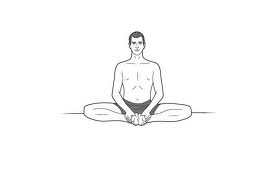
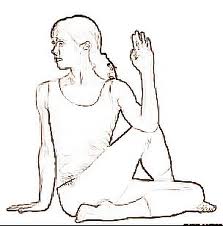
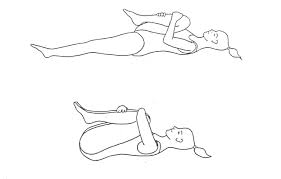
- Halasana
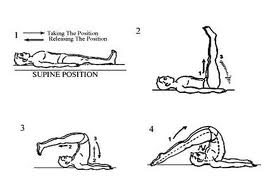
- Malasana
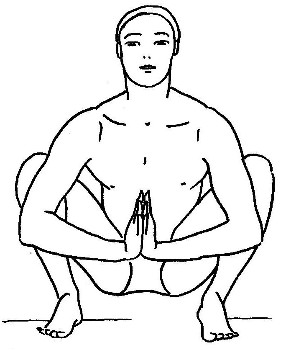
- Padahastasana
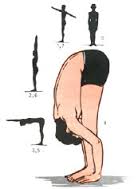
- Shashankasana
